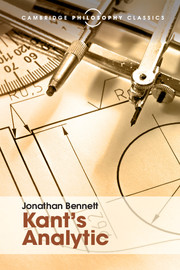9 - Transcendental Deduction: further aspects
from Analytic of concepts
Published online by Cambridge University Press: 05 July 2016
Summary
Objectivity and ‘what solipsism means’
I want now to justify Kant's preoccupation with the first-person singular case in his treatment of mental identity, and also to introduce an important new aspect of the Transcendental Deduction. These two aims are linked by the concept of an objective state of affairs, which Kant, not quite happily, calls the concept of an object. This is the concept which marks the difference between ‘I have a sensation of warmth’ and ‘There is something hot in my vicinity’, and between ‘I have a visual field as of seeing something red’ and ‘There is something red which I see’.
A good part of Kant's account of this concept can be found in the four paragraphs on A 104–6, but it is also scattered throughout the Transcendental Deduction in both versions: see for example the paragraph on A 128–30, and the two on B 140–2. It is an account which I, like Strawson, have assumed to be fundamentally correct throughout §§11– 13; but it must now be subjected to scrutiny.
Kant's analysis of the concept of an objective state of affairs rests squarely on his phenomenalism. He says that when we think we have knowledge about objects,
the object is viewed as that which prevents our modes of knowledge from being haphazard or arbitrary, and which determines them…in some definite fashion. For in so far as they are to relate to an object, they must necessarily agree with one another, that is, must possess that unity which constitutes the concept of an object.
Thus, if I employ the concept of an object by saying ‘I see something which is red’, I do not merely report my visual field but also commit myself to something about what other intuitions I should have if I were to change my position, close my eyes, etc. That is, I bring my visual field ‘under a rule’ which relates it to other intuitions which I have had, do have, shall have or might have. If the rule is not obeyed, then I have either applied the concept of an object wrongly or erred in introducing it at all.
- Type
- Chapter
- Information
- Kant's Analytic , pp. 132 - 146Publisher: Cambridge University PressPrint publication year: 2016



